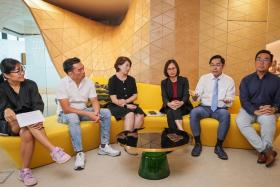'My daughter is a ticking time bomb'
A mother's story
Jane's smile hides her mother's fear.
"My daughter is a ticking time bomb, there is really no way of telling what will happen tomorrow," says Madam Grace Chin, 55.
Her fingertips trace across her daughter's forehead to put her fringe back in place. Another smile.
Jane's condition means that she does not talk much. One of her doctors dubbed her the "silent fighter".
The first thing that grabs your attention about Madam Chin is her eyes - they have a strong, steely gaze, yet every so often a glisten of hope comes through.
A hope that comes from caring for someone with a terminal disease.
Her 28-year-old daughter Jane Tan suffers from a condition called Melas (mitochondrial encephalomyopathy, lactic acidosis and stroke-like episodes) - a rare degenerative disease that slowly destroys the brain, nervous system, organs and muscles.
It was not always this way.
Jane used to be healthy and enjoyed cooking, travelling and being with her friends for most of her teens.
That changed when she was diagnosed at 17.
Today, severe muscle dystrophy has left her wheelchair-bound.
She experiences splitting headaches, vomiting, loss of appetite, seizures and strokes on a regular basis.
DENIAL
Jane's condition is heartbreaking for Madam Chin.
"I was in denial. I couldn't accept that this could happen to my daughter," she says.
Early signs of trouble surfaced in 2004, when Jane abruptly lost her hearing. She was 15 and in Secondary 3.
Despite this, she was able to sit for her O-level examinations the following year, and her results secured her a place to study applied food sciences and nutrition at Temasek Polytechnic.
A mandatory pre-enrolment health screening alerted her to abnormal amounts of protein in her urine.
Tests led to a prognosis of suspected kidney failure.
A muscle biopsy confirmed the presence of Melas and from that point, life for the family was turned on its head.
The unpredictable nature of her daughter's illness means that Madam Chin can never let her guard down.
"What is more painful than seeing her in this condition is not knowing when things will take a turn for the worse."
Apart from being a full-time housewife and caregiver, Madam Chin is also her daughter's closest friend and treasured confidant.
From accompanying her daughter to weekly dialysis sessions and doctor's appointments, to administering hourly medication and keeping vigil by her bedside at night, Madam Chin tirelessly ensures that all her daughter's needs are met.
Whether it is watching the latest Korean dramas or trying out new recipes together, mother and daughter share an inseparable bond.
Madam Chin can find it an arduous task financing her daughter's home-based palliative care each month.
She says that medication, specialist check-ups and dialysis sessions can cost up to $3,500 a month.
Madam Chin's husband is the sole breadwinner of the family of five and things can hit rock bottom when their daughter has to undergo an operation.
The family is ineligible for a number of subsidies and grants because they own private property - a shophouse in Bedok where her husband sells furniture.
"Many patients I've spoken to feel that if you really cannot afford it, then yes, the Government will step in," says Madam Chin.
"If you are rich, then of course you can pay for it."
Her tone turns to one of resignation: "It is just us, the middle income group, that gets caught in the middle."
Thankfully, since last November, some help has come in the form of the Medication Assistance Fund.
What Jane misses most of all is the company of friends.
She struggles to speak, taking a whole breath to say each word.
"In the past, my friends and classmates, who could come, visited me whenever they could," she says before pausing to regain her strength.
"But everyone is so caught up with life, and most of them are working or married, so I hardly see them."
She admits it pains her that she cannot do the things most of us take for granted.
"Some days, it can be a little tough when I see friends living their lives, travelling and shopping, while I am wheelchair-bound."
That playful smile emerges again.
"But life goes on."
Get The New Paper on your phone with the free TNP app. Download from the Apple App Store or Google Play Store now



